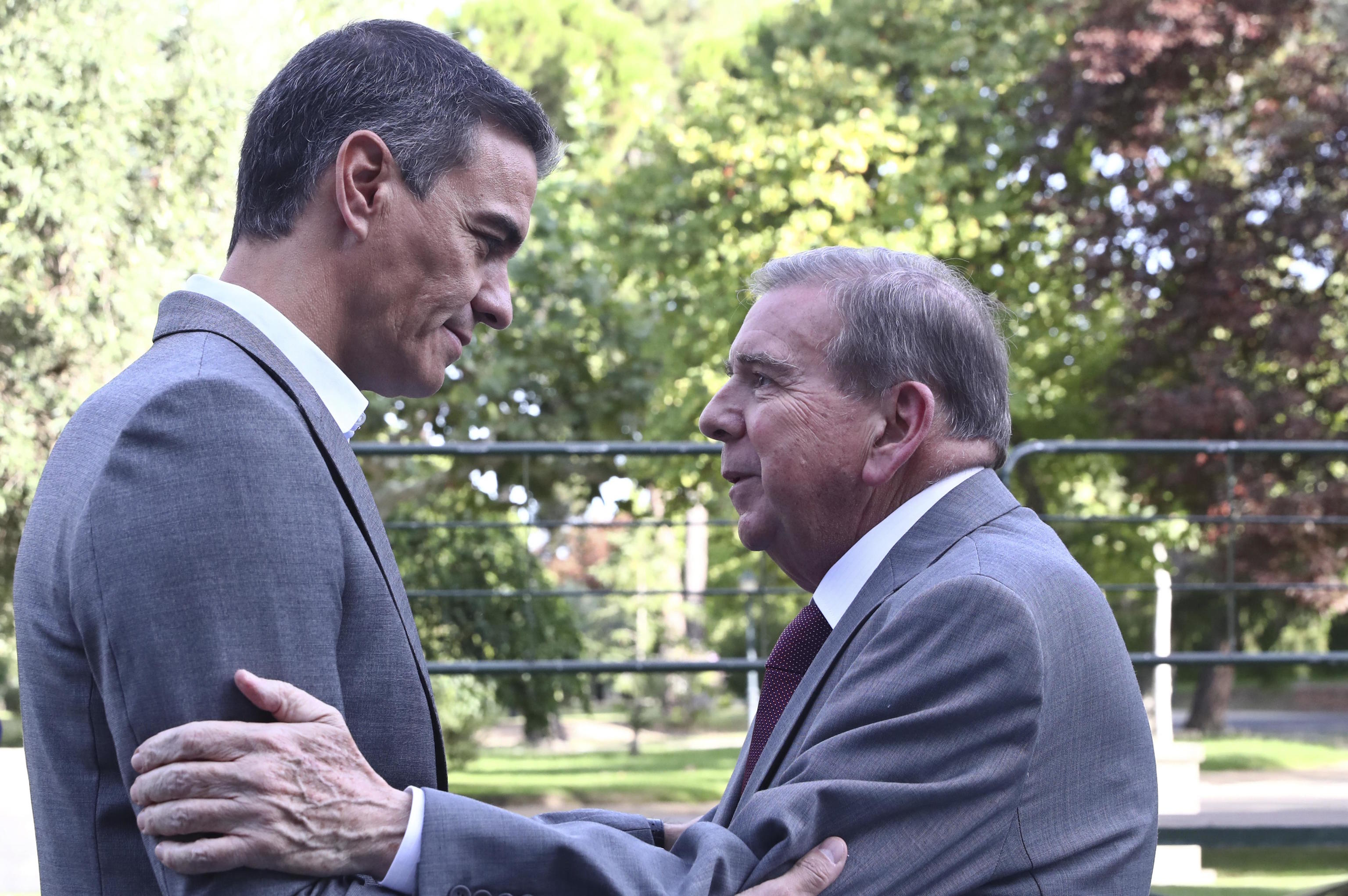The President of Spain, Pedro Sánchez has met with Venezuelan opposition candidate Edmundo González this Thursday at La Moncloa, as reported by EL MUNDO. The meeting took place after the Venezuelan diplomat arrived in Spain last Sunday, where he will receive political asylum, following a process that was planned over several days. González landed in Madrid on a Spanish Air Force plane at his own request after spending a few days in hiding at the residence of the Spanish ambassador in Caracas.
"I warmly welcome Edmundo González to our country, showing Spain's humanitarian commitment and solidarity with the Venezuelan people. Spain continues to work in favor of democracy, dialogue, and the fundamental rights of the Venezuelan people," wrote Sánchez on social media about the meeting with the Venezuelan politician, whom he received as part of a private visit not listed on the official agenda of the Prime Minister.
In turn, the Venezuelan opposition leader acknowledged Sánchez's interest in working for the recovery of democracy and respect for human rights in Venezuela.
"Dear compatriots, today I had a very pleasant and interesting conversation with the Spanish Prime Minister, Pedro Sánchez, at La Moncloa, where I thanked him for his willingness to receive me and my wife in Spain," González said in a message to his compatriots accessed by Efe.
"At the same time, I expressed our appreciation for his interest in working for the recovery of democracy and respect for human rights in our country," added González Urrutia, who attended the meeting with Sánchez accompanied by his daughter Carolina González.
"I also reaffirmed my determination to continue the fight to uphold the sovereign will of the Venezuelan people expressed on July 28 by more than 8 million voters," the Venezuelan opposition leader pointed out in the message released after the meeting with the Spanish Prime Minister, which lasted for an hour.
The meeting took place just hours after the Spanish Prime Minister returned from his trip to China and just a day after the Congress of Deputies, at the request of the PP, called on the Government to recognize him as the elected president of Venezuela.
The vote in Congress resulted in 177 votes in favor of recognizing Edmundo González's victory in the elections on July 28, compared to 164 against and one abstention (from former minister José Luis Ábalos). The PSOE voted against the PP's initiative, which was supported by Vox, PNV, Coalición Canaria, and UPN.
Following this outcome, the Chavismo directly threatened in the early hours with breaking diplomatic relations with Spain: "This is the most brutal assault by the kingdom of Spain against Venezuela since the times we fought for our independence. Do they want a fight? We want it too. What the Congress of Deputies did is equivalent to a declaration of war against the people of Venezuela and against the legitimate government, and we will not accept it," angrily exclaimed Jorge Rodríguez, president of the Chavista legislative body and main negotiator for Maduro. In fact, it was Delcy Rodríguez's brother who led the negotiations for Edmundo González's exile in Spain.
"All diplomatic, commercial, and consular relations must be severed immediately, all diplomatic representatives and consuls must leave here, and ours must return from there. Let them stay with their murderers, their coup plotters, their fascists, and their violent ones," added Rodríguez, urging to expedite the process to inform the Government of Nicolás Maduro.
Despite these warnings, the Government's spokesperson, Pilar Alegría, stated on Thursday that "the Spanish embassy in Venezuela is operating normally" and that the Spanish Government's interest is to "maintain the best relations with the Venezuelan people."
The spokesperson for the PSOE in the Congress of Deputies, Patxi López, when asked about this, said that "it demonstrates that the PP's policy of anything goes to attack the Government has consequences."
"In this case, believing that they were attacking the progressive Government, what they have done is attack all companies that have commercial relations and businesses in Venezuela, and that is worrying because it is a scorched-earth policy that the PP usually practices, everything they do has consequences and they are not good for this country," he lamented.
When asked if he is concerned about Wednesday's vote, he said "no" and in his opinion, "the anecdote is being elevated to a category."
"Natural Behavior of a Dictatorship"
The PP, on the other hand, considers it a "natural behavior of a dictatorship" to attack countries that criticize it, in response to the request that will be made by the Venezuelan Parliament, controlled by Chavismo, to sever relations with Spain, as a reaction to the recognition, by the Congress, of Edmundo González as the president of Venezuela.
"It is a normal and natural behavior of a dictatorship: it attacks and subjugates the freedom of its citizens and also points fingers and confronts all those countries that point out that it is a dictatorship," stated the PP spokesperson, Borja Sémper, in an interview with Telecinco on Thursday, regarding the reaction provoked by the PP's initiative approved by the Congress.
Noelia Núñez, Deputy Secretary of Mobilization and Digital Challenge of the PP, spoke out after the meeting between González and Sánchez at La Moncloa to criticize the leader of the PSOE for not taking the opportunity during his meeting with the Venezuelan opposition candidate to recognize him as the elected president of Venezuela. In her view, there was a chance to "correct" the PSOE's vote against that recognition in Congress, and it was a missed opportunity.
"We do not understand why the PSOE refuses to recognize Edmundo González. We do not know if it is due to political or economic interests of the entire Socialist Party, led in this case by former President José Luis Rodríguez Zapatero, or because Sánchez prefers to pay homage to the Maduro dictatorship rather than fight for democracy," she emphasized.
